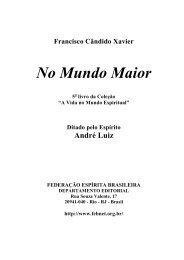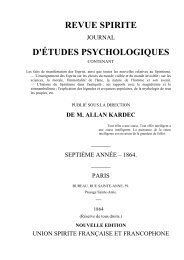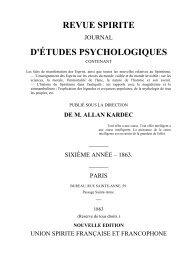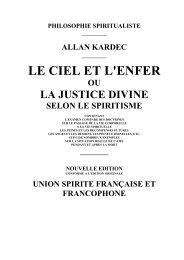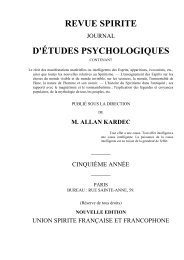PDF version - Geae
PDF version - Geae
PDF version - Geae
Create successful ePaper yourself
Turn your PDF publications into a flip-book with our unique Google optimized e-Paper software.
infinitely with the evolution of the individual. The good, wise, and pure soul cannot find happiness in the same<br />
manner as the vulgarian. As we mount, the aspect of things changes, and the child, growing, disdains the toys<br />
which once captivated him. So the growing soul seeks nobler satisfactions and pleasures more profound. The<br />
soul which looks from the heights and sees the glorious aim of life finds more felicity and serene peace in a<br />
beautiful thought, a good work, an act of virtue, and even a purifying sorrow, than in all material wealth and<br />
earthly glories, with their false intoxications. It is difficult to make man understand that suffering is good. Each<br />
one would remake and embellish his life to his own taste, pluck from it all annoyances and troubles, not<br />
thinking that there is no good without ill, no ascension without toil and effort.<br />
The general tendency of man is to shut himself in the narrow circle of individualism, of self, and in<br />
that way he dwarfs and limits all that is great in himself – all that is meant to dilate and grow and soar: the<br />
thought, the consciousness – in a word, the soul. To break this circle and give freedom to the imprisoned<br />
virtues, sorrow is necessary. Misfortunes and trials stir in us the sources of an unknown life – a more profound<br />
life. Sadness and suffering cause us to see, hear, and feel a thousand delicate and powerful things that the<br />
happy or the vulgar man never perceives. The material world begins to seem obscure – another is vaguely<br />
designed but grows more and more distinct, in the measure that our attention is detached from inferior things<br />
and plunged into the illimitable.<br />
Misfortune and anguish are needed to give the soul its richness, its moral beauty, and to awaken its<br />
sleeping senses. The sorrowful life is an alembic from which are distilled souls for better worlds. The form,<br />
like the soul, is embellished by suffering. There is a charm, at once tender and serious, in the faces which have<br />
been often bathed in tears. They take on an austere beauty – a sort of majesty – impressive, yet seductive.<br />
Michael Angelo adopted, as rule of his life, the following principles: ‘Enter into yourself, and do as<br />
the sculptor does with the work he seeks to make beautiful. Chisel off that which is superfluous, make clear<br />
that which is obscure, let in the light from everywhere, and never cease chiseling your own statue.’ A sublime<br />
maxim, and which contains the principle of inner perfection. The soul is our work – a work which surpasses in<br />
grandeur all the partial manifestations of art.<br />
Often the difficulties of execution are in accord with the splendor of the aim; and before this painful<br />
task of interior reform, of incessant combat with the passions and material conditions, how often is the artisan<br />
discouraged! How often he drops his chisel in despair! It is then God sends him an aid – sorrow! Sorrow goes<br />
into the depths of the consciousness where the toiler himself could not penetrate, and remodels the contours,<br />
and eliminates or destroys that which is useless or bad. And from the cold marble without form or beauty,<br />
from the ugly or coarse statue that our hands have hardly outlined, sorrow brings forth in time the chefd’oeuvre<br />
incomparable, the harmonic form of the divine Psyche.<br />
* * *<br />
Sorrow does not, then, strike only the culpable. In our world, honest men suffer as much as the<br />
wicked. The virtuous soul, being more evolved, is more sensitive. Besides this, it loves deeply, and so seeks<br />
sorrow, knowing the price. There are souls who come to earth for no other purpose than to give an example of<br />
grandeur of suffering. They are missionaries, and their mission is no less grand than that of the great revealers.<br />
We meet them in all times, and they occupy all planes of life – on high summits, splendid with the light of<br />
history, and they are found among the humble and hidden in the common masses. We admire Christ, Socrates,<br />
Antigone, but how many obscure victims of duty and love fall every day, upon whom descend silence and<br />
forgetfulness. Yet their example is not lost: it illuminates the life of someone who was a witness to it. To be<br />
full and fruitful, it is not indispensable that a life should be sown with acts of great sacrifice, or crowned by a<br />
tragic death in the eyes of the world. There are many sad, colorless, effaced lives which are a continual effort,<br />
a constant strife against misfortune and suffering. If we knew the hidden wounds in these hearts – the cruel<br />
disappointments concealed from the world, they would be as interesting in our sight as the most celebrated<br />
martyrs.<br />
By this incessant combat with destiny they become heroic souls. Their triumphs are unknown, but all<br />
the treasures of energy, of generous impulses, of patience and love which they have accumulated day by day,<br />
constitute a capital of moral force and beauty which makes them equal to the noblest figures of history in the<br />
world beyond.<br />
118



